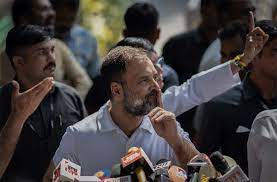Monitoring Desk
NEW DELHI: A little more than two months ago, the Congress party, India’s biggest opposition force, seemed to be on a roll. Rahul Gandhi, the leader of what is the country’s oldest political movement, the party of Mahatma Gandhi, had attracted large crowds on a nationwide march, rekindling hopes in the Congress that had been struggling for relevance after a series of political setbacks.
In May, the party won legislative elections in the southern state of Karnataka that is home to startup capital Bengaluru, unseating Prime Minister Narendra Modi’s Bharatiya Janata Party. And it was projected, in opinion polls, to win four out of five states – Madhya Pradesh, Rajasthan, Telangana, Chattisgarh and Mizoram – that voted for their state assemblies in November.
Those predicted wins, party veterans said, would have provided the ballast for the Congress to take Modi on in the general elections that are now weeks away. Just the opposite happened. The opinion polls were wrong. The Congress won only Telangana.
“All opinion polls showed Congress was ahead by 2 percent votes in Madhya Pradesh elections, but we lost by 8 percent of votes. How did the final results go contrary to these opinion polls?” asks senior party leader, Digvijay Singh, former chief minister of the central Indian state. Answering that question and similar ones tied to the gulf between the party’s hopes and recent results, quickly could be central to the chances of the 138-year-old party as it prepares to lock horns with Modi in the coming national vote, say analysts and Congress leaders.
A strong showing in those state elections would have validated Rahul Gandhi’s Bharat Jodo Yatra (Uniting India March), which had seen him walk more than 4,000km (2,485 miles) over 150 days, from the country’s southern tip, Kanyakumari, to Indian-administered Kashmir in the north. In most of the states that voted in November, the Congress was in a direct one-on-one contest with the BJP and was in the opposition, hoping to reap the benefits of anti-incumbency voter sentiment against the ruling government.
One Congress leader in Madhya Pradesh, who requested anonymity, claimed that he had warned the party leadership that it needed to concentrate mobilisation efforts around the state’s 21 percent tribal vote, but that his attempts at persuasion failed. “Congress was very complacent,” the leader said. The BJP, he said, gained, focusing on tribal communities, and securing their votes. Many of the seats that the Congress had won in the 2018 assembly elections flipped to the BJP. The same script played out in Rajasthan and Chattisgarh where the BJP also won the bulk of seats where tribal votes dominate, reversing what had happened in 2018.
Party insiders also accuse leaders of arrogance, in spurning the offers of smaller regional parties like the Samajwadi Party, which is primarily based in Uttar Pradesh, India’s most populous state, but also has a small presence in Madhya Pradesh. Some, like former chief minister Singh, see a more nefarious plot unfolding: he alleged that the rigging of electronic voting machines and a mechanism to keep a paper trail of voting had allowed the BJP to buck opinion polls in the recent elections.
But there is little hard evidence of systematic rigging in those elections, and critics of the Congress point out that it is quick to accept results when it wins using the same processes that it criticises while losing. Many Congress leaders do not agree with Singh’s assertion. One of them said that in Madhya Pradesh, it was clear that the party was losing – not because of any foul play but because of poor “both management”, a reference to the practice of party workers ensuring that their voters come and vote at every polling station.
The Congress has tried to revive its fortunes by embracing regional parties in a national coalition called the INDIA alliance. That move forced the BJP to rethink its own strategy. But since then, the BJP has successfully chipped away at the INDIA alliance: Nitish Kumar, the chief minister of the northern state of Bihar has broken away and joined the BJP-led NDA coalition. — Aljazeera







